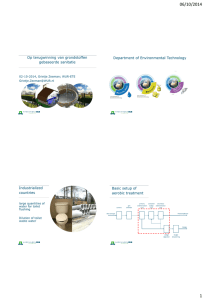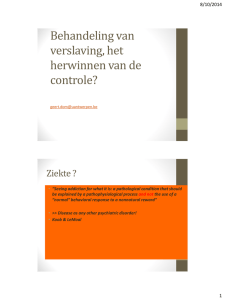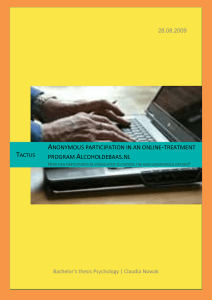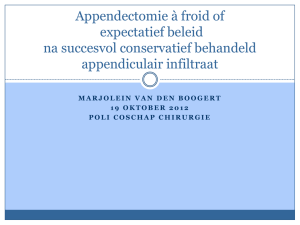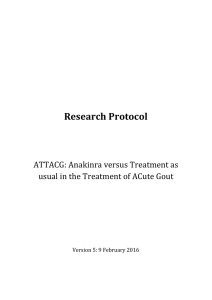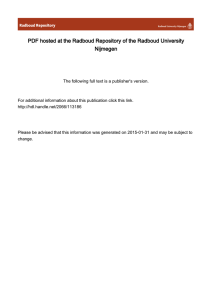Vacature onderzoeker PROSPER def - galop
advertisement
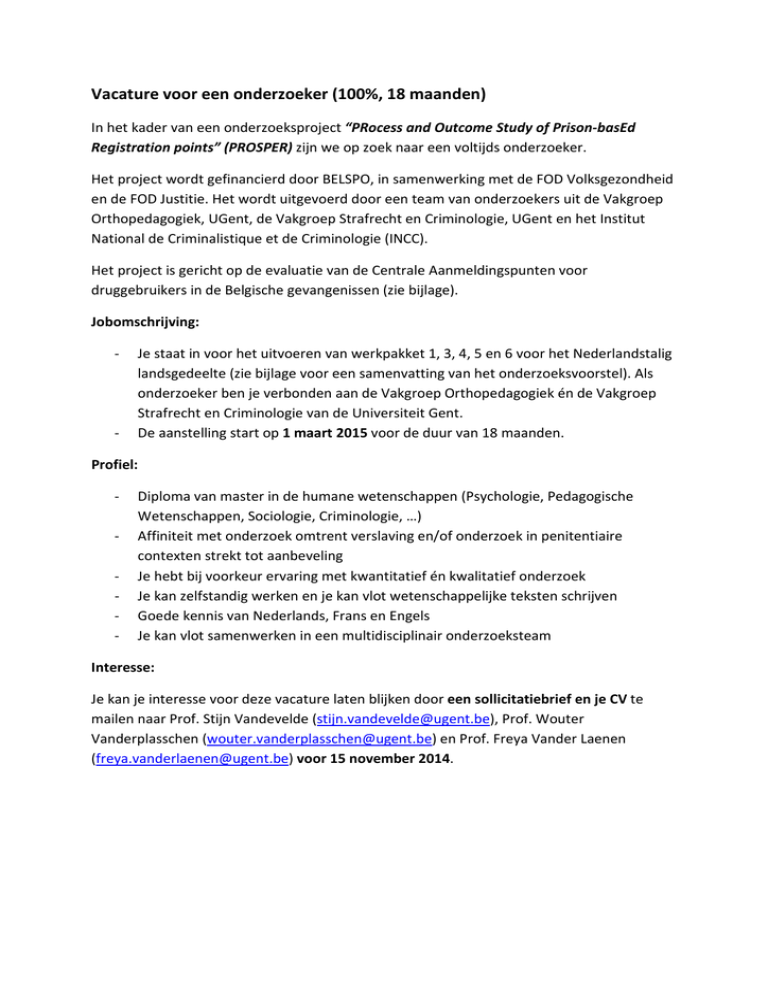
Vacature voor een onderzoeker (100%, 18 maanden) In het kader van een onderzoeksproject “PRocess and Outcome Study of Prison-basEd Registration points” (PROSPER) zijn we op zoek naar een voltijds onderzoeker. Het project wordt gefinancierd door BELSPO, in samenwerking met de FOD Volksgezondheid en de FOD Justitie. Het wordt uitgevoerd door een team van onderzoekers uit de Vakgroep Orthopedagogiek, UGent, de Vakgroep Strafrecht en Criminologie, UGent en het Institut National de Criminalistique et de Criminologie (INCC). Het project is gericht op de evaluatie van de Centrale Aanmeldingspunten voor druggebruikers in de Belgische gevangenissen (zie bijlage). Jobomschrijving: - - Je staat in voor het uitvoeren van werkpakket 1, 3, 4, 5 en 6 voor het Nederlandstalig landsgedeelte (zie bijlage voor een samenvatting van het onderzoeksvoorstel). Als onderzoeker ben je verbonden aan de Vakgroep Orthopedagogiek én de Vakgroep Strafrecht en Criminologie van de Universiteit Gent. De aanstelling start op 1 maart 2015 voor de duur van 18 maanden. Profiel: - Diploma van master in de humane wetenschappen (Psychologie, Pedagogische Wetenschappen, Sociologie, Criminologie, …) Affiniteit met onderzoek omtrent verslaving en/of onderzoek in penitentiaire contexten strekt tot aanbeveling Je hebt bij voorkeur ervaring met kwantitatief én kwalitatief onderzoek Je kan zelfstandig werken en je kan vlot wetenschappelijke teksten schrijven Goede kennis van Nederlands, Frans en Engels Je kan vlot samenwerken in een multidisciplinair onderzoeksteam Interesse: Je kan je interesse voor deze vacature laten blijken door een sollicitatiebrief en je CV te mailen naar Prof. Stijn Vandevelde (stijn.vandevelde@ugent.be), Prof. Wouter Vanderplasschen (wouter.vanderplasschen@ugent.be) en Prof. Freya Vander Laenen (freya.vanderlaenen@ugent.be) voor 15 november 2014. Bijlage 1 – Samenvatting van het project “PRocess and Outcome Study of Prison-basEd Registration points” (PROSPER) Introduction - Prison populations throughout Europe have gradually been growing over the past decades (EMCDDA, 2012). Large numbers of these imprisoned offenders experience health problems, including alcohol and drug abuse, mental health problems and/or dual diagnosis. A wellknown review showed that 17% to 30% of the men and 10% to 24% of the women were diagnosed with alcohol misuse or dependence (Fazel, Bains, & Doll, 2006). For illegal drug abuse and dependence, numbers were even higher and ranged from 10% to 48% of the men and 30% to 60% of women. Substance use and abuse is also prevalent in Belgian prisons, as about 2 out of 3 incarcerated offenders reported having ever used illegal substances. More than 1 out of 3 of these offenders stated to have used a substance during incarceration and 11.7 % said to have used an illicit substance for the first time when imprisoned (EMCDDA, 2012; Van Malderen, 2012). The reciprocal interrelations between substance use and criminal involvement are well-documented and have often been described in the literature (Martin, O’Connel, et al., 2011). Moreover, both substance abuse and recidivism could be considered as relapsing conditions, which explains why most offenders go through multiple treatment episodes on their way to ‘recovery’ (Martin, O’Connel, et al., 2012; McLellan, 2002). Given the complexity of prisoners’ health problems discussed above (Rutherford & Duggan, 2009), meeting these diverse and often entangled needs has been recognized as a public health priority by the European Union (EMCDDA, 2012). In Belgium, treatment and care for incarcerated people should respond to the same standards as care provided outside prison, which is guaranteed by the Law of January 12, 2005 on principles governing the administration of prison establishments and the legal status of detainees. This also relates to the provision of substance abuse treatment in prison settings. Although there is a general dearth of outcome studies on prison-based substance abuse treatment, positive results on criminal recidivism and substance abuse have been reported for therapeutic communities, especially when aftercare is provided (Wexler & Prendergast, 2010). With regard to substitution treatment, a randomized clinical trial showed that methadone maintenance therapy provided to prisoners with a pre-incarceration history of heroin addiction was effective for the interruption of the cycle of relapse into recidivism and re-incarceration, and that methadone maintenance therapy initiated in prison was superior to counselling only (Kinlock, Gordon, et al., 2009). A systematic review on opioid maintenance treatment in prison led to the conclusion that a number of studies demonstrated a significant reduction in heroin use, while the effects on recidivism turned out to be equivocal (Hedrich et al., 2012). As acknowledged by the EMCDDA (2012, p. 23), this review underscored the “importance of establishing a liaison between prison and community-based programmes in order to achieve continuity of treatment and longer-term benefits”. A similar conclusion has recently been formulated by other researchers who pointed at the relevance of establishing treatment linkage points (including diversion projects and referring inmates to continuous care) throughout the criminal justice system (Belenko, Hiller, & Hamilton, 2013). At the same time, they recommend further research into the effects of treatment and linkage for offenders at various stages of the criminal justice process, including prison-based services. This project proposal addresses this international recommendation through evaluating the Central Registration Points (CRPs) in Belgium, which are operational in almost all prisons in Wallonia, Flanders and Brussels. CRPs can be characterized as brief case management intervention and a type of liaison between prison and community drug treatment. CRPs aim at supporting incarcerated offenders with a substance abuse problem in finding adequate treatment on their release by means of three objectives: (1) providing information about treatment services; (2) increasing clients’ motivation and readiness for treatment; and (3) referring clients to as well as establishing contact with treatment services in the community. Due to the low number of CRP staff and the large number of prisoners with drug problems, CRP-staff can generally only meet once or twice for a relatively short period of time with each detainee (the mean number of contacts per client in Flemish and Walloon prisons is about 1.6). Because of this high caseload, CRPs indicate that their activities are often limited to referring clients to treatment services (objective 3) at the cost of the other two aims. Up until now, no scientific evaluation of the CRPs has been performed. Aims of the study – This study entails the evaluation of the CRPs in terms of its effectiveness, with a focus on different indicators that incorporate the objectives set forth by the CRPs as well as the main outcome variables mentioned in the call. In more detail, the aims of this study are threefold: 1. To investigate how the CRPs currently operate and what the effects are on offenders’ trajectories in term of linkage to treatment services and treatment-related outcomes, including motivation, treatment engagement, retention, health and psychosocial functioning and recidivism 2. To document how the CRPs are perceived by the different stakeholders that are involved (CRP-staff-members, CRP-participants, prison staff, treatment providers, …) in terms of current functioning, strengths and limitations and future challenges and opportunities. 3. To formulate policy recommendations with regard to the further continuation, expansion and/or modification of the CRPs. Methodology - In order to realize these objectives, we propose a multi-method study design that comprises six work packages. In WP 1, available data from CRPs will be analysed in order to get a clear view on the care trajectories and treatment-related outcomes (services to which clients are referred, referral outcome, …). WP 2 aims to assess the relation between the activities performed by the Central Registration Points and their potential effect on criminal recidivism. WP 3 is a qualitative process evaluation in which the perceptions of different stakeholders will be collected and analysed. WP 4 entails a registration study in which additional, relevant characteristics of CRP-participants will be systematically registered by the CRP staff members. WP 5 involves two phases. The first phase (5.1) relates to the pilot implementation of a group-based “short duration programme”. The second phase (5.2) concerns a prospective naturalistic cohort study that will enables to assess relevant outcomes (e.g. linkage, treatment engagement and retention, motivation, health, psychosocial functioning and quality of life. In WP6, the findings from the various work packages will be integrated and reported.
